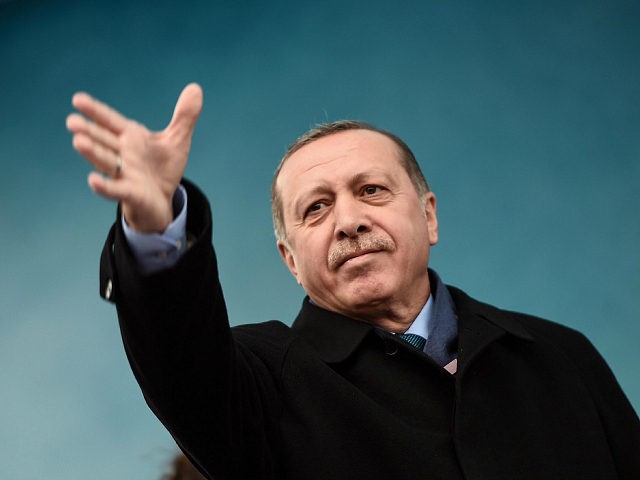A mob of supporters of President Recep Tayyip Erdogan attacked a women’s rally urging Turks to vote “no” in the upcoming constitutional referendum, which would greatly expand Erdogan’s powers as president should the “yes” vote win in April.
According to the anti-Erdogan newspaper Cumhuriyet, which published video of the incident, women rallying in support of a “no” vote on April 16 were attacked by a mob in Istanbul after a man can be heard in the video shouting “get rid of them.” When a young woman complained of the attack, “six to seven people, including the person who initially attacked the women, started to beat the young person, punching and kicking.”
A woman present at the attack told Cumhuriyet: “These are attacking us everywhere. We are beaten. This is not the first time. They attacked in front of the subway station the other day… they are swearing at us, insulting us, trying to beat us.”
The newspaper Hurriyet also reports on an incident in which a rally organized Sunday by Nationalist Movement Party (MHP) lawmaker Meral Akşener in favor of the “no” vote turned violent after “a group of Ülkücü (Idealist) supporters attacked.” “Idealism” is a Turkish political ideology embraced by nationalists; “Idealist Hearths” is one of several sometimes-violent nationalist youth groups in Turkey. The idealists attempted to pelt Akşener with eggs while she spoke. The MHP supports a “yes” vote in the referendum.
The referendum seeks to transition Turkey out of a parliamentary system and into a presidential system, eliminating the office of the Prime Minister and transferring those powers to Erdogan in addition to his current presidential authority.
Due to the constitution being written for a parliamentary system, it lacks significant checks and balances written into the founding documents of long-established presidential systems, leading many in Turkey to fear that an emboldened Erdogan would use his new powers to crack down on the opposition.
Erdogan has argued that, due to the string of terrorist attacks on Turkey by the Islamic State, the Marxist Kurdistan Workers’ Party (PKK), and the alleged terror organization of elderly Islamic cleric Fethullah Gulen, he needs more executive freedoms to keep the nation safe.
Erdogan blames Gulen, who resides in Pennsylvania, for the July 2016 coup attempt against him. Turkey is currently processing eighteen individuals suspected of having organized and attempted the coup, charged with the death of a senior Turkish military official Erdogan’s government has hailed as a martyr.
On Monday, a pro-Erdogan mob made their presence known at the Ankara courthouse holding a hearing for the suspects, hanging Gulen himself in effigy and demanding the death penalty for the suspects. Turkey abolished the death penalty in anticipation of its bid to join the European Union, but Erdogan himself now supports reinstating it after several weeks of extreme diplomatic tensions with Europe in which he has referred to German and Dutch officials as “Nazis.”
Mob violence — Islamist mob violence in particular — has skyrocketed during Erdogan’s presidential term (Erdogan previously served as vice president). In a recent incident, a Muslim mob attacked an International Women’s Day event at Bilgi University, chanting “Allahu akbar” while storming the gates to beat students commemorating the achievements of women in history.
In January, a Muslim mob chanting, “there is no god but Allah,” attacked a public rally of Kemalists (secular followers of Mustafa Kemal Atatürk) holding a banner reading, “Turkey is secular and will remain secular.” Mobs of Erdogan supporters have attacked the headquarters of Hurriyet newspaper on multiple occasions and attacked individual women on the street for being insufficiently covered and allegedly supporting Gulen.
Erdogan’s government has acted by punishing alleged Gulenists and launching a campaign against alleged supporters of Kurdish independence and Kurdish terrorist groups. US News & World Report cites the Turkish Interior Ministry as announcing that more than 2,000 people were detained in the past week for being allegedly tied to the PKK or the Islamic State.
Over 150,000 people have been detained, arrested, fired, or otherwise persecuted for ties to Gulen. Among those implicated: the prosecutor in the case against the alleged coup plotters, who allegedly used an encryption app popular among Gulenists.
The pro-Erdogan newspaper Sabah reported last week that investigators estimate over 8,000 soldiers in the Turkish military were Gulenists before the July coup.

COMMENTS
Please let us know if you're having issues with commenting.